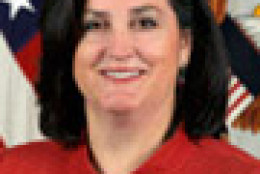Defense
-
When the Navy needs to reform a program it sometimes turns to a special test called an Analysis of Alternatives. Right now the Navy's analysts are hard at work on acquisition reform. Ryan Dickover is director of eBusiness Policy and Oversight in the Office of the Deputy Assistant Secretary of the Navy for Research, Development and Acquisition. He explained the AoA process on In Depth with Francis Rose.
August 20, 2014 -
The Navy awarded blanket purchase agreements to 17 small businesses, which they hope will take care of most DoD's conference planning needs for the next three years.
August 20, 2014 -
The Navy puts its wounded sailors back to work before they're even discharged from the hospital. The Wounded Warrior Intern Program takes wounded sailors interested in science and engineering careers and puts them to work at Naval Sea Systems Command. Dr. Tom Murphy is the program manager. He explained how the program works on In Depth with Francis Rose.
August 19, 2014 -
Katherine Hammack, assistant secretary of the Army for Installations, Energy and Environment, says shrinking forces won't be enough to match sequestration-level budgets.
August 19, 2014 -
Secretary of Defense Chuck Hagel called the crew aboard the U.S. ship MV Cape Ray Monday to congratulate the ship's crew on finishing their unprecedented work of neutralizing the most dangerous chemicals in Syria's declared stockpile at sea. The secretary said that by ridding the world of these materials, they - as part of an ongoing international effort to eliminate the Syrian chemical weapons arsenal - have helped make an important and enduring contribution to global security.
August 19, 2014 -
Shrinking force size and changing force structure are two reasons the Defense Department continues to push for another round of base realignment and closure. The Army will likely shrink the most of any of the services, and they are already returning 21 locations to their home countries in Europe. But most members of Congress still oppose another BRAC round in the States. Katherine Hammack is Assistant Secretary of the Army for Installations, Energy, and Environment. On In Depth with Francis Rose, she said the Pentagon is making some progress.
August 18, 2014 -
In this week's edition of Inside the DoD Reporter's Notebook, Jared Serbu examines news and buzz in the Defense community that you might have missed including: Pending the outcome of a Justice Department investigation, the Director of Naval Intelligence still has no security clearance; DARPA's former director is found to have improperly endorsed her former company; and changes are coming to the way DoD uses firm fixed price level of effort contracts.
August 15, 2014 -
Agencies are struggling to find a good way to ensure employees have access to only the information they are supposed to have access to. Now, one could be close to a solution. The Air Force is launching a pilot program to test role-based authentication. Federal News Radio's Executive Editor Jason Miller joined Emily Kopp on the Federal Drive with details. Read Jason's related article.
August 15, 2014 -
The service will test out a role-based authentication technology on an application in the MilCloud run by DISA. Frank Konieczny, the Air Force's chief technology officer, said the pilot could move into full production in six months. DoD is considering adding the role-based capability to the JIE framework.
August 15, 2014 -
The Army has thousands of personnel working full-time on cyber, but so far, those soldiers have no dedicated career path. That may be about to change.
August 15, 2014 -
Scott B. Miserendino Sr., a former contracting official with the Navy's Military Sealift Command, pleaded guilty on Tuesday, Aug. 12 to conspiracy to commit bribery and accepting bribes as a public official.
August 14, 2014 -
Gary Wyckoff, the chief information officer of the Office of Naval Research, said ONR is on the cusp of putting several applications in the cloud. He said mobility is a more difficult road to travel.
August 14, 2014 -
With industry help, Army builds an open architecture and a set of open standards to chart a robotics acquisition strategy that's more modular, more interoperable and hopefully more cost effective.
August 14, 2014 -
Assistant secretary of the Army for Installations, Energy and Environment, Katherine Hammack, is back from a round of visits to Army bases to see how they're dealing with climate change. She says readiness is dependent upon how they prepare for a future of limited energy resources. She explained what she saw on In Depth with Francis Rose.
August 13, 2014 -
In order to stay on the cutting edge of mission-focused innovation, the Air Force Research Lab's Information Directorate in Rome, N.Y. conducts research on matters regarding command, control, communications, cyber and intelligence, better known as C4I . On this edition of AFCEA Answers, we'll learn more about the activities of the AFRL Information Directorate from its director, George Duchak. He'll tell us how a newly-developed device that mimics the human brain - a neuromorphic computer - may someday help future Air Force officers make better and faster decisions. We'll also learn how AFRL scientists are teaming with local students to determine how to commercialize the results of their research. And, on this edition of AFCEA Answers, you can glean insights from Mr. Duchak on how to improve the acquisition of information technology.
August 13, 2014








